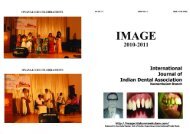hand book for dental surgeons - Indian Dental Association ...
hand book for dental surgeons - Indian Dental Association ...
hand book for dental surgeons - Indian Dental Association ...
Create successful ePaper yourself
Turn your PDF publications into a flip-book with our unique Google optimized e-Paper software.
15<br />
Visit: http://image.idakunnamkulam.com/<br />
Hand <strong>book</strong> <strong>for</strong> <strong>dental</strong> <strong>surgeons</strong> on <strong>dental</strong> management of persons with hemophilia and other haemostatic disorders<br />
<strong>Dental</strong> infections<br />
ORAL MEDICINE<br />
Many patients with infections of <strong>dental</strong> origin are managed without the use of antibiotics but instead by <strong>dental</strong><br />
extraction or endodontic treatment. Antibiotics are often used to treat an acute bacterial infection.This should be<br />
considered <strong>for</strong> all patients with inherited bleeding disorders since surgical intervention should be avoided if<br />
possible. The initial treatment usually starts based on the normal oral pathogens, Streptococcus viridans,<br />
anaerobic gram-negative rods. Antibiotic regimes should cover all of these groups of organisms.<br />
Penicillin is a first line antibiotic used to treat <strong>dental</strong> infections.It can be taken orally in the <strong>for</strong>m of pencillin<br />
V.Metronidazole is extremely effective in treating anaerobes and is often used in combination with pencillin to<br />
give good coverage of both the aerobic and anaerobic bacteria present in the oral cavity. The does of the drugs<br />
may vary depending on the availiblity in different countries but the treatment should continue <strong>for</strong> 5-7days. A<br />
number of different <strong>for</strong>mulations of penicillin are available with a broader spectrum of activity. These can be<br />
used either alone or in conjunction with metronidazole. However, it is important to remember that if these drugs<br />
are ineffective treatment of the infection will become more complicated. Erythromycin and clindamycin have<br />
been prescribed to patients who are allergic to penicillin. These drugs can be used in conjuction with<br />
metronidazole. Erythromycin may be effective in people with penicillin allergies, but it may not be suitable <strong>for</strong><br />
more severe infections. Clindamycin produces high alveolar concentrations, and bactericidal activity is reached<br />
with the usual recommended oral dose of 150mg every 6 hous. In more severe cases it can be given<br />
intravenously. It has been reported that clindamycin can cause antibiotic-associated colitis and there<strong>for</strong>e is<br />
often reserved <strong>for</strong> the treatment of the more serious infections or when penicillin has failed.<br />
Visit : http://image.idakunnamkulam.com/<br />
Hand <strong>book</strong> <strong>for</strong> <strong>dental</strong> <strong>surgeons</strong> on <strong>dental</strong> management of persons with hemophilia and other haemostatic disorders



